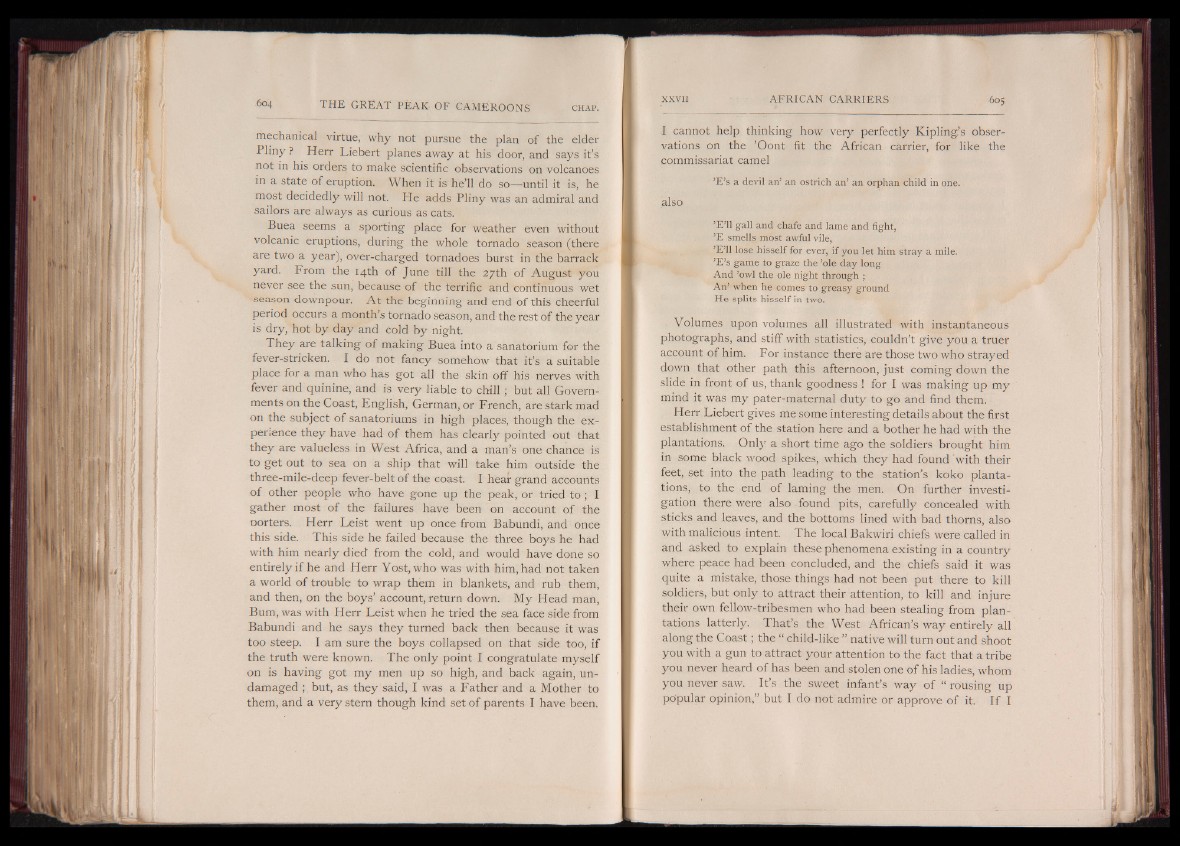
mechanical virtue, why not pursue the plan of the elder
Pliny ? Herr Liebert planes away at his door, and says it’s
not in his orders to make scientific observations on volcanoes
in a state of eruption. When it is he’ll do so— until it is, he
most decidedly will not. He adds Pliny was an admiral and
sailors are always as curious as cats.
Buea seems a sporting place for weather even without
volcanic eruptions, during the whole tornado season (there
are two a year), over-charged tornadoes burst in the barrack
yard. From the 14th of June till the 27th of August you
never see the sun, because of the terrific and continuous wet
season downpour. A t the beginning and end of this cheerful
period occurs a month’s tornado season, and the rest of the year
is dry, hot by day and cold by night.
They are talking of making Buea into a sanatorium for the
fever-stricken. I do not fancy somehow that it’s a suitable
place for a man who has got all the skin off his nerves with
fever and quinine, and is very liable to chill; but all Governments
on the Coast, English, German, or French, are stark mad
ori the subject of sanatoriums in high places, though the experience
they have had of them has clearly pointed out that
they are valueless in West Africa, and a man’s one chance is
to get out to sea on a ship that will take him outside the
three-mile-deep fever-belt of the coast. I hear grand accounts
of other people who have gone up the peak, or tried t o ; I
gather most of the failures have been on account of the
oorters. Herr Leist went up once from Babundi, and once
this side. This side he failed because the three boys he had
with him nearly died- from the cold, and would have done so
entirely if he and Herr Yost, who was with him, had not taken
a world of trouble to wrap them in blankets, and rub them,
and then, on the boys’ account, return down. My Head man,
Bum, was with Herr Leist when he tried the sea face side from
Babundi and he says they turned back then because it was
too steep. I am sure the boys collapsed on that side too, if
the truth were known. The only point I congratulate myself
on is having got my men up so high, and back again, undamaged
; but, as they said, I was a Father and a Mother to
them, and a very stern though kind set of parents I have been.
I cannot help thinking how very perfectly Kipling’s observations
on the ’Oont fit the African carrier, for like the
commissariat camel
’E’s a devil an’ an ostrich an’ an orphan child in one.
also
’E’ll gall and chafe and lame and fight,
’E smells most awful vile,
’E’ll lose hisself for ever, if you let him stray a mile.
’E’s game to graze the ’ole day long
And ’owl the ole night through ;
An’ when he comes to greasy ground
He splits hisself in two.
Volumes upon volumes all illustrated with instantaneous
photographs, and stiff with statistics, couldn’t give you a truer
account of him. For instance there are those two who strayed
down that other path this afternoon, just coming down the
slide in front of us, thank goodness ! for I was making up my
mind it was my pater-maternal duty to go and find them.
Herr Liebert gives me some interesting details about the first
establishment of the station here and a bother he had with the
plantations. Only a short time ago the soldiers brought him
in some black wood spikes, which they had found with their
feet, set into the path leading to the station’s koko plantations,
to the end of laming the men. On further investigation
there were also found pits, carefully concealed with
sticks and leaves, and the bottoms lined with bad thorns, also
with malicious intent. The local Bakwiri chiefs were called in
and asked to explain these phenomena existing in a country
where peace had been concluded, and the chiefs said it was
quite a mistake, those things had not been put there to kill
soldiers, but only to attract their attention, to kill and injure
their own fellow-tribesmen who had been stealing from plantations
latterly. That’s the West African’s way entirely all
along the Coast; the “ child-like ” native will turn out and shoot
you with a gun to attract your attention to the fact that a tribe
you never heard of has been and stolen one of his ladies, whom
you never saw. It’s the sweet infant’s way of “ rousing up
pdpular opinion,” but I do not admire or approve of it. I f I